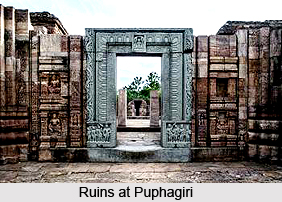 Puphagiri, situated atop Langudi hills of Odisha, was an ancient Buddhist Mahavihara established in 3rd century AD. It flourished in this region till 11th century AD. Langudi hills spread across the Cuttack and Jajpur districts of the state.
Puphagiri, situated atop Langudi hills of Odisha, was an ancient Buddhist Mahavihara established in 3rd century AD. It flourished in this region till 11th century AD. Langudi hills spread across the Cuttack and Jajpur districts of the state.
The monument is presently in ruins. The campus of the actual Mahavihara extends over three hilltops, namely Udayagiri, Ratnagiri and Lalitgiri, and houses a number of temples, monasteries and stupas. Exquisite sculptures and beautiful architecture of Gupta dynasty adorn these structures. The campus stands in a picturesque landscape whose beauty is further augmented by Kelua River, a tributary of the Brahmani River which flows along north east of Langudi hills. Puphagiri was considered as one of the primary institutions of higher education in ancient India and was often ranked with Takshila, Vikramshila and Nalanda. The remains of Puphagiri were discovered 1995 by a lecturer of a local college. The mention of this Mahavihara can also be found in the Nagarjunakonda inscriptions.
History of Puphagiri
Much of the history of Puphagiri is still shrouded in mystery. Through iconographic analysis it has been established that the place was built during the Sunga period of 2nd century BC. It is enlisted amongst the oldest Buddhist establishments in the world. Some images of King Ashoka have been the major discoveries in Puphagiri. This discovery supports the prediction that probably the establishment of Puphagiri was originally funded by King Ashoka.
Tourism in Puphagiri
Archaeological Survey of India has contributed much in the conservation Puphagiri which has emerged as an international tourist destination. The State Government of Orissa has also started the celebration of Buddha Mahotsava in the site every year. The surrounding areas of Puphagiri also invite numerous tourists with attractive architectures such as a unique rock-cut elephant, encircled by four monolithic `khondalite` pillars. This structure dates back to the 3rd century, B.C, during the reign of Maurya Empire. Deuli hills, located nearby is the centre of ancient caves with five rock-cut Buddhist chambers. A few other Buddhist sites can also be witnessed nearby Puphagiri such as Paikrapur, Sarapur and Bajragiri. In fact, all these sites on Langudi collectively make up the largest historic Buddhist complex in the country.






































